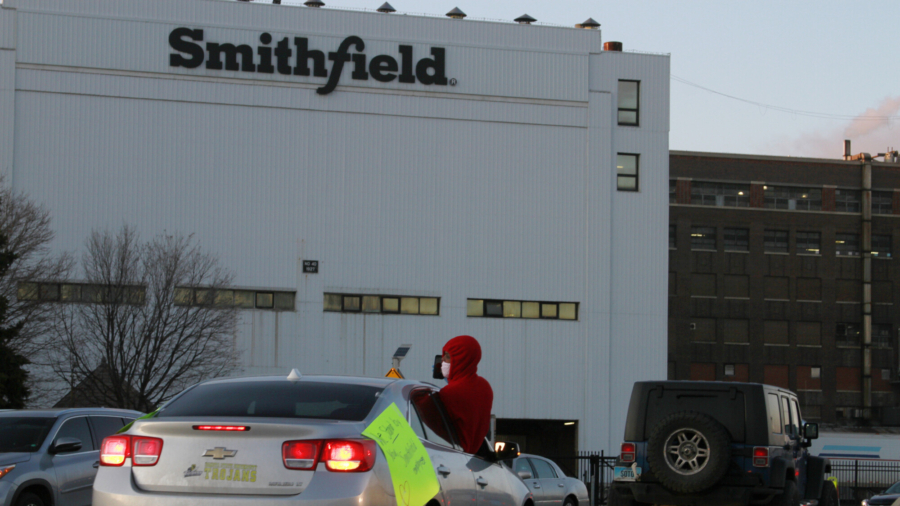OMAHA, Neb.—At least 59,000 meatpacking workers caught COVID-19 and 269 workers died when the virus tore through the industry last year, which is significantly more than previously thought, according to a new U.S. House report released Wednesday.
The meatpacking industry was one of the early epicenters of the coronavirus pandemic, with workers standing shoulder-to-shoulder along production lines. The U.S. House Select Subcommittee on the Coronavirus Crisis, which used internal documents from five of the biggest meatpacking companies for its report, said companies could have done more to protect their workers.
The new estimate of infections in the industry is nearly three times higher than the 22,400 that the United Food and Commercial Workers Union has said were infected. And the true number could be even higher because the companies’ data didn’t generally include coronavirus cases confirmed by outside testing or self-reported by employees.

At the height of the outbreaks in spring last year, U.S. meatpacking production fell to about 60 percent of normal levels as several major plants were forced to temporarily close for deep cleaning and safety upgrades or operated at slower speeds because of worker shortages. The report said companies were slow to take protective steps such as checking employee temperatures, distributing protective equipment and installing barriers between work stations.
“Instead of addressing the clear indications that workers were contracting the coronavirus at alarming rates due to conditions in meatpacking facilities, meatpacking companies prioritized profits and production over worker safety, continuing to employ practices that led to crowded facilities in which the virus spread easily,” the report said.
The North American Meat Institute trade group defended the industry’s response to the pandemic.
“Frontline meat and poultry workers were among the first impacted by the pandemic, but publicly available data confirm that comprehensive measures implemented in the sector since spring 2020, including extensive infection prevention and vaccination efforts, have successfully protected the sector’s dedicated and diverse workforce as they have continued feeding Americans and keeping our economy working,” said Julie Anna Potts, president and CEO of the trade group
The report is based on documents from JBS, Tyson Foods, Smithfield Foods, Cargill and National Beef. Together they control over 80 percent of the beef market and over 60 percent of the pork market nationwide.
Cargill, Tyson, Smithfield and JBS released statements Wednesday saying they worked aggressively to meet federal health and safety standards and took additional measures to protect their employees, such as conducting widespread testing and urging employees to get vaccinated.
“Throughout the pandemic, we’ve worked hard to maintain safe and consistent operations. At the same time, we have not hesitated to temporarily idle or reduce capacity at processing plants when we determined it necessary to do so,” Cargill spokesman Daniel Sullivan said.
The companies expressed regret at the toll the virus has taken.
“Even one illness or loss of life to COVID-19 is one too many, which is why we’ve taken progressive action from the start of the pandemic to protect the health and safety of our workers,” Tyson spokesman Gary Mickelson said.
The report said infection rates were especially high at some meatpacking plants. At a JBS plant in Hyrum, Utah, 54 percent of the workforce contracted the virus between March 2020 and February 2021. Nearly 50 percent of workers at a Tyson plant in Amarillo, Texas, were infected in the same time frame. And 44 percent of employees at National Beef’s plant in Tama, Iowa, caught COVID-19 from April 2020 to February 2021.
The report said internal documents show Smithfield aggressively pushed back against government safety recommendations after experts from the Centers for Disease Control and Prevention inspected its pork plant in Sioux Falls, South Dakota—the site of a major outbreak. A few days earlier, Smithfield’s CEO emphasized the severity of the problem when he told the CEO of National Beef in an email that “Employees are afraid to come to work.”
Debbie Berkowitz, with Georgetown University’s Kalmanovitz Initiative for Labor and the Working Poor, said the industry was slow to respond and federal regulators didn’t force them to act.
“When the pandemic hit, of course it was going to hit meatpacking plants really hard and really fast,” said Berkowitz, who was scheduled to testify at a House hearing on the report Wednesday. “What was the industry’s response—not to protect workers and mitigate the spread of COVID-19, not to separate workers 6 feet apart, which was the earlier guidance that came out in late February—but to just keep on going.”
By Josh Funk


